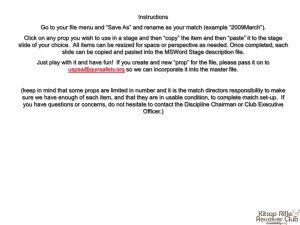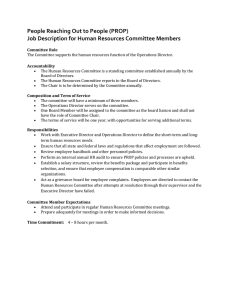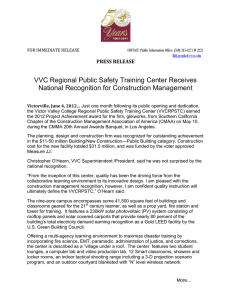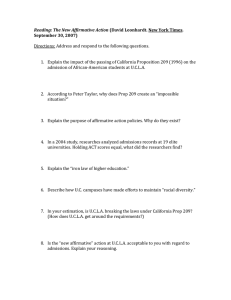AS_Voter_Guide.ppt
advertisement
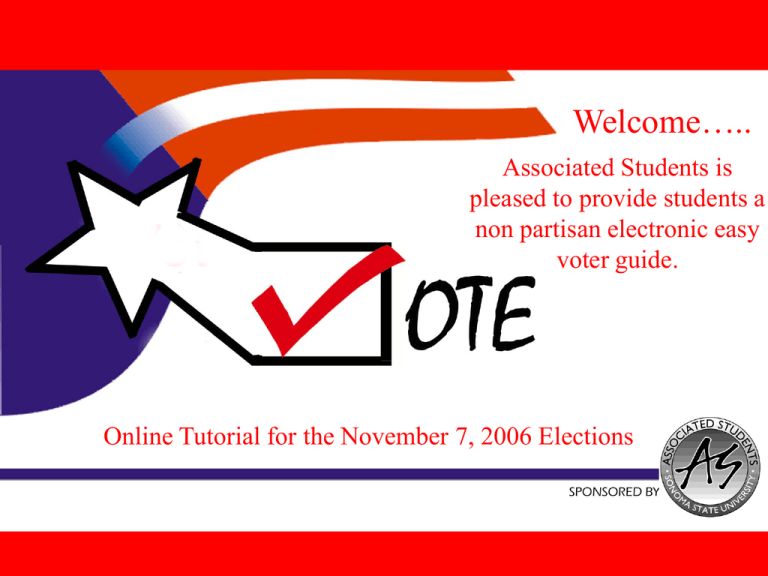
Welcome….. Associated Students is pleased to provide students a non partisan electronic easy voter guide. Online Tutorial for the November 7, 2006 Elections What is on the Nov. Ballot???? • General Election Information 1. Voter Registration Information 2. How to vote? • Propositions 1.Prop 1A: Transportation Funds 2. Prop 1B: Transportation Bonds 3. Prop 1C: Public Housing Bonds 4. Prop 1D: Bond for School & College Buildings 5. Prop 1E: Flood Control Bond 6. Prop 83: Punishment for Sex Crimes 7. Prop 84: Bond for Water & Resources 8. Prop 85: Parental Notification about Abortion 9: Prop 86: Cigarette Tax 10. Prop 87: Oil Tax for Clean Energy 11. Prop 88: Property Tax for Education 12. Prop 89: Public Funding of Political Campaigns 13. Prop 90: Property Rights • Candidates for Statewide Offices How to Vote? How to Vote 1. Vote in Person: At your “polling place” on Election Day, Tuesday Nov. 7, 2006 open from 7 a.m. to 8 p.m. At locations selected by your county elections office before or on Election Day. Need Help finding you polling place: Find your County Clerk Office 2. Vote By Mail To vote by mail, you use an “absentee ballot” – which means you will be absent from your polling place on Election Day. a. Apply for an Absentee Ballot at your county clerks office by October 31, 2006 b. Receive and fill out your ballot c. Important deadline! Be sure to mail your ballot back in time so that it arrives at the elections office by Election Day. Or, you can drop it off at any polling place in your county between 7 a.m. and 8 p.m. on Election Day. Prop 1A: Transportation Funds Would change the California Constitution to ensure that funds from the state sales tax on gas are used for transportation. Current Situation: CA has a 6% sales tax on gasoline which makes a $2 billion revenue •Before 2002 that money was used for program spending such as education, health and social services, and prisons. • In 2002, voters changed the CA Constitution so that gas sales tax money could only be used for transportation, except in a state budget emergency • Since 2003-05, this sales tax money has been used to balance the state budget, not for transportation Effect on Government Spending: No change in total spending People for 1A say: • Prop 1A keeps lawmakers from raiding funds the voters have set aside for transportation. • California needs to invest in roads to reduce traffic congestion and improve safety. People Against 1A say: • California still has budget problems. This reduces what can be spent on services like education and health care. • This type of 'set aside' makes it harder for state lawmakers to do their jobs. For more information on Prop 1A please click here Prop 1B: Transportation Bonds Would allow the state to sell $19.9 billion in bonds for improvements and repairs to reduce traffic congestion, expand local transit, and improve air quality, earthquake safety and security. Current Situation: CA spends about $20 billion each year on transportation 'infrastructure,' like highways, roads, using state and local taxes and federal funds •Most transportation spending has been 'pay as you go,' meaning that spending is limited to what is raised each year (compared to using bonds to borrow money). •Since 1990, state bonds have been less than 5% of total transportation spending. Effect on Government Spending: New state spending of about $39 billion to pay off $19.9 billion in bonds plus $19 billion in interest over 30 years. People Against 1B Say: People for 1B say: • California cannot afford to keep on • We need to spend more on borrowing. Bonds are not 'free money' transportation to secure a strong future and make our state budget problems for California. It will improve our worse. economy, our traffic and our safety. • A 'no' vote on Prop 1B will force state • Prop 1B lets us invest in long overdue lawmakers to pay for transportation transportation projects without raising with the money we have. taxes. For more information on Prop 1B please click here Prop 1C: Public Housing Bonds Would allow the state to sell $2.85 billion in bonds for housing projects and related development, assistance for renters and first-time and low-income homebuyers, and homeless shelters. Current Situation: Private companies build most housing in California. Some home and building projects get low interest government loans by agreeing to sell or rent to low-income Californians. There are other state programs that help first-time and low-income homebuyers with the cost of a down payment. In 2002, voters approved $2.1 billion in bonds for state housing programs. Most of that money has been spent. Effect on Government Spending: New state spending of about $6.1 billion to pay off $2.85 billion in bonds plus $3.3 billion in interest over 30 years. People for 1C say: • It is harder than ever for working families to afford housing. Prop 1C is an important step forward and creates 87,000 jobs. • Over 360,000 Californians are homeless. Prop 1C will provide safe housing for some of the people who need the most help. People Against 1C say: • Public bonds should only be used for long term public purposes like bridges, roads and schools. Private builders should build homes, not the government. • It costs $2 to pay back every $1 that we borrow. California cannot afford this debt. Click here for more information on Prop 1C Prop 1D: Bonds for School & College Buildings Would allow the state to sell $10.4 billion in bonds to build and upgrade K-12 schools, community colleges and public university facilities. Current Situation: Over the past 10 years, voters have approved $34.5 billion in state bonds for K-12 school, community colleges and public universities construction projects. Most of that money has already been spent. To get state bond money, a school district must put up half the cost of a new building or 40% for repairs to old ones. Usually, the school's local matching funds come from voter-approved bonds. Community colleges also sometimes use local bonds to pay for construction. California's public universities cannot use local bonds and therefore rely mostly on state bonds and private gifts. Effect on Government Spending: New state spending of about $20.3 billion to pay off $10.4 billion in bonds plus $9.9 billion in interest over 30 years. People for 1D say: • Prop 1D will repair 31,000 classrooms, build 9,500 new classrooms and provide 3,000 job-training facilities. • Too many schools are overcrowded, making it hard for students to get a quality education. People Against 1D say: • Instead of taking on more 30-year debt, we should encourage better use of existing facilities. • Most schools got nothing from the last state bond and most will get nothing from this one. Click here for more information on Prop 1D Prop 1E: Flood Control Bonds Would allow the state to sell $4.1 billion in bonds to repair levees and provide flood protection in the Central Valley plus fund flood safety projects in other parts of the state. Current Situation: A majority of the people in California get their drinking water from rivers that flow in the Central Valley. State government is responsible for 1,600 miles of levees that keep the rivers from flooding cities and towns. The state also provides assistance for flood control projects in other parts of California. The effect in government spending include a new state spending of about $8 billion to pay off $4.1 billion in bonds plus $3.9 billion in interest over 30 years. People for 1E say: • These repairs are long overdue. We need to be ready for natural disasters. • This helps protect hundreds of thousands of homes and drinking water for 22 million Californians. People Against 1E say: • The state should not take on more debt for something that federal and local governments should pay for. • Prop 1E will pay for only a small part of the needed repairs. Click here for more information on Prop 1E Prop 83: Punishment for Sex Crimes Would increase penalties and restrictions for people convicted of sex crimes. Current Situation: People convicted of certain sex crimes must register with local police departments and keep the police informed of where they are living. There are now about 90,000 registered sex offenders in California. People convicted of certain crimes against children cannot live near a school while still on parole. Some high-risk sex offenders are monitored with electronic devices while on parole or probation. The most dangerous sex criminals may be kept in a state mental hospital after serving their prison sentence. The effect in government spending includes an increased operating costs for prisons, hospitals and monitoring due to an increase in prison population. The cost could be a couple hundred million dollars per year within 10 years. One-time building costs at prisons and state mental hospitals could be several hundred million dollars. People for 83 say: • Prop 83 protects all of us by keeping dangerous sex criminals in prison longer and keeping them away from schools and parks. • This gives police the tools they need to keep track of sex criminals. People Against 83 say: • Prop 83 wastes hundreds of millions of dollars monitoring low-risk, nonviolent offenders for the rest of their lives. • Similar laws have been tried in other states and failed to reduce crime. Click here for more information on Prop 83 Prop 84: Bond for Water & Resources Would allow the state to sell $5.4 billion in bonds to ensure safe drinking water and current water supply, restore waterways and flood control. Current Situation:The state has a variety of programs to conserve natural resources, protect the environment, control flooding, offer outdoor recreation, and plan for future natural resource needs. Local governments and nonprofit organizations have similar programs that receive funding from the state. In the last 10 years voters have approved about $11 billion in bonds for spending on natural resources. The effect in government spending includes new state spending of about $10.5 billion to pay off $5.4 billion in bonds plus $5.1 billion in interest over 30 years. People for 84 say: • Prop 84 will help ensure our water supply is clean, reliable and safe, and will protect California's rivers, lakes, beaches and bays. • This allows every region of the state to choose how they will meet increasing demands on our water resources People Against 84 say: • Local projects should be funded by local communities. State bonds should only be used for projects that benefit the whole state. • Paying off these bonds will take priority over other government spending like education and health care programs. Click here for more information on Prop 84 Prop 85: Parental Notification about Abortion Would require a doctor to notify a parent or guardian at least 48 hours before performing an abortion on a minor (an unmarried girl under 18 years old). Currently, a pregnant minor (an unmarried girl under 18 years old) can get an abortion in California without telling her parents. This Prop. would change the CA Constitution to require a doctor to notify a parent or guardian at least 48 hours before performing an abortion on a minor. The law requires parental notification, but it would not require parental consent to the abortion. Parental notification would not be required in case of a medical emergency or if the young person gets approval from juvenile court. Effect in Government Spending: Possible increase in state costs of several million dollars per year for health and welfare programs and court expenses. People for 85 say: • A pregnant teenager needs the support of her parents before and after she decides what to do. • Teens hiding an abortion from their parents may delay getting help for medical problems after the abortion. People Against 85 say: • Teenagers who are afraid to tell their parents, or are too scared to go to a judge, may turn to unsafe abortions. • Prop 85 is part of a larger strategy to chip away at legal abortion in the United States. Click here for more information on Prop 85 Prop 86: Cigarette Tax Would add a new state tobacco tax of $2.60 per pack of cigarettes to pay for hospital emergency care, children’s health insurance, and other health programs. Current Situation: A pack of cigarettes costs about $4.00 in California. This includes $0.87 in state tobacco taxes, most of which were approved by voters fo32r early childhood development programs, tobacco education and prevention, and heath care for low-income uninsured people. This Prop. would add another state tobacco tax of $2.60 per pack of cigarettes, making the total price per pack about $6.60. Effect in Government Spending: The new tax would raise about $2.1 billion per year for health care at first, but would bring in less as smoking decreases. People against 86 say: People for 86 say: • This 300% tax increase is unfair to • This tax increase will cause 500,000 adults smokers and will create new crime by to stop smoking, keep 700,000 kids from making a truckload of stolen cigarettes becoming smokers and prevent 300,000 worth millions of dollars. deaths. • Prop 86 is written to benefit hospitals • Prop 86 pays for critical health care services and will save California about $16 and specific health care programs. Less billion in long-term health care costs from than 10% of the Prop 86 funds are for smoking related illnesses. services to help smokers quit. Click here for more information on Prop 86 Prop 87: Oil Tax for Clean Energy Would set up a $4 billion program to reduce the use of oil and promote clean energy, funded by a new tax on oil pumped in California. Current Situation: About 12% of the oil pumped in the U.S. comes from California. Oil companies pay state income tax on profits earned in California. Oil producers also pay a fee of 6.2 cents per barrel of oil pumped in California. Effect in Gov. Spending: The new tax on oil would bring in $225 million to $485 million each year, and would stop after the $4 billion program was paid for. People for 87 say: • Prop 87 makes oil companies pay their fair share for cleaner energy and makes it illegal for them to pass on the cost to consumers. • This would provide rebates on alternative fuel vehicles and renewable energy like solar and wind power. People Against 87 say: • This makes taxes on oil pumped in California higher than in other states. That means California will import more oil and have higher gas prices. • Spending on this program can continue even if it does not lead to any less use of oil. Click here for more information on Prop 87 Prop 88: Property Tax for Education Would create a new state “parcel” tax of $50 on each property to pay for specific K-12 education efforts such as class-size reduction, textbooks and school safety programs. The way it is now: California currently has 6.3 million K-12 public school students. Last year, $38 billion of the state's $93 billion General Fund was spent on K-12 education. Property owners pay a local tax based on the value of their property. In some school districts, voters have also approved 'parcel taxes' where owners typically pay the same amount for each property. These local school parcel taxes need two-thirds of the voters to approve them. There is no state parcel tax. Effect in Government Spending: New state spending of about $450 million each year for specific education programs. People for 88 say: • Students in one-third of California classrooms don't have a textbook to take home. Teachers are paying for basic supplies. • Prop 88 funds will go directly into classrooms to reduce class sizes, buy learning materials and help make schools safer. People Against 88 say: • Prop 88 creates a whole new kind of state tax that is easier to pass than local property taxes. This opens the gates for special interests to pass their own taxes. • Prop 88 lets state lawmakers give your tax money to any school district in the state. Click here for more information on Prop 88 Prop 89: Public Funding of Political Campaigns Would set up a system of public funding for political campaigns for candidates for state office who agree to certain conditions (with the public funds raised by increasing the state income tax on corporations by 0.2 percent). The way it is now: Campaign spending in California has reached record levels. Candidates for state elected office pay for their political campaigns with contributions from people, political parties, companies and groups. There are some limits on the size of these contributions. Candidates can use an unlimited amount of their own money. Effect on government spending: The corporate tax increase would raise over $200 million each year, which would cover the costs of the new system of public funding of political campaigns in California. People for 89 say: • Prop 89 will reduce the power that special interests and groups that make big campaign contributions have over our elected officials. • This will make it easier for people who do not have big money connections to run for office. People Against 89 say: • Prop 89 does not limit how public funds are spent, so taxpayers could end up paying for negative campaign ads and mailers. • Voters have already adopted campaign contribution limits. We don't need Prop 89. Click here for more information on Prop 89 Prop 90: Property Rights Would prevent governments from forcing the sale of private property for private use; it would also require that property owners be paid for major economic losses caused by new laws or zoning changes. The way it is now: State and local governments have the power (called 'eminent domain') to take private property for public use as long as the owner is paid a fair price. Governments use this power to buy property from owners who do not want to sell when the land is needed for public facilities like roads, schools, and parks, or to redevelop rundown areas. At times, governments have forced the sale of property to allow private developers to build new homes, stores or businesses. People for 90 say: • It's wrong to force landowners to give up their property so that a retail store, shopping mall or expensive housing can be built. • When laws are passed that reduce your property value, it's only fair that you are paid for your losses. People Against 90 say: • This would lead to costly lawsuits and would discourage government actions that benefit the public and the environment. • This would drive up the costs of schools, roads and other public facilities and would reduce local landuse authority. Click here for more information on Prop 90 List of Candidates for Statewide Elected Office 1. Governor 2. Lieutenant Governor 3. Secretary of State 4. Controller 5. Treasurer 6. Attorney General 7. Insurance Commissioner Candidates for Governor Phil Angelides Party: Democrat Arnold Schwarzenegger Party: Republican Edward C. Noonan Party: American Independent Party I have created my own business, met a payroll, built environmentally sustainable communities. In eight years as Treasurer, I have cracked down on corporate Fraud, fought for balanced budgets, and invested to create jobs and clean up the environment. •Invest to give all of our children a first class education •Enact fair, balanced budgets that protect schools and transportation •Protect our quality of life to make California the best place to create jobs As Governor I have led California back the brink of bankruptcy by not raising taxes, reducing the structural deficit, repealing the car tax and fixing worker’s compensation. The result: 500,000 new jobs and record investment in education. •Strengthen California’s schools so our students are prepared for tomorrow •Strengthen and build California’s economy to create jobs •Protect California’s families with strong laws to protect our children I am the Area Director for the American Independent Party and a committee member for the National Constitution Party. •Reduce illegal immigration and deport illegal residents •Veto unconstitutional bills from state legislators •Cut State Spending by 30% each year Candidates for Governor (cont.) Peter Miguel Camejo Party: Green Art Olivier Party: Libertarian Janice Jordan Party: Peace & Freedom I stand for the people of California, not just the rich. I work to defend the environment and have knowledge and experience with budget issues, pensions and developing affordable housing. I oppose the death penalty and “three strikes” law. •Education: California spends 600$ less per student than the national average; it can be 600$ more. California needs a governor that can say no to wasteful spending. As the mayor of Bellflower, I was able to eliminate the city’s lighting tax assessment and at the same time improve services through privatization and a competitive bidding process. •Reduce spending and taxes •Eliminate public benefits for illegal immigrants •End gridlock by using all gasoline taxes, vehicles license fees and sales tax on automobiles for road construction and maintenance I was born and raised in California. My passion for social and political issues is to affect positive change in all communities. •Health Care •Livable wage •Immigrant rights Lieutenant Governor Responsibilities John Garamendi Democrat Tom McClintock Republican Jim King Donna Warren American Independent Green Lynnette Shaw Libertarian Stewart Alexander Peace & Freedom State Insurance Commissioner California State Senator Real Estate Broker Financial Manager/Author Caregiver/Musicia n Automobile Sales Consultant Secretary of State Responsibilities Debra Bowen Democrat Bruce McPherson Republican Glenn McMillon, Jr. Forest Hill American Independent Green California State Senator Appointed Secretary of State Small Business Owner Financial Advisor Gail K. Lightfoot Libertarian Retired Nurse Margie Akin Peace & Freedom Archaeologist/Med ical Anthropologist Controller Responsibilities John Chiang Democrat Member, State Board of Equalization Taxpayer Organization Minister Tony Strickland Republican Warren Mark Campbell Laura Wells American Independent Green Donna Tello Libertarian Tax Accountant Elizabeth Cervantes Barron Peace & Freedom Retired Teacher Financial Systems Consultant Treasurer Responsibilities Bill Lockyer Democrat California Attorney General Claude Parrish Republican American Independent Mehul M. Thakker Green Member, State Board of Equalization Computer Technician Investment Advisor Marian Smithson Libertarian City Treasurer/CPA Gerald Sanders Peace & Freedom Union Electrician/ Longshoreman E. Justin Noonan Attorney General Responsibilities Jerry Brown Democrat Chuck Poochigian Republican Oakland Mayor/ Attorney California State Senator/ Attorney Michael S. Wyman Green Attorney at law Kenneth A. Weissman Libertarian Attorney at law Jack Harrison Peace & Freedom Attorney/ Rent Commissioner Insurance Commissioner Responsibilities Cruz M. Bustamante Steve Poizner Democrat Jay Earl Burden Larry Cafiero American Independent Green Dale F. Ogden Libertarian Actuary/ Insurance Consultant Tom Condit Peace & Freedom Writer Republican California Lieutenant Businessman/ Entrepreneur Student Newspaper Editor Associated Students Inc. This guide has been brought to you by Associated Students, your student government working for you! Easy Voter Guide: www.easyvoter.org For local propositions: www.smartvoter.org For more information, contact Reham Ariqat – ariqat@sonoma.edu Legislative Affairs Director Associated Students Inc. Nadir Vissanjy as.president@sonoma.edu President Associated Students Inc.
